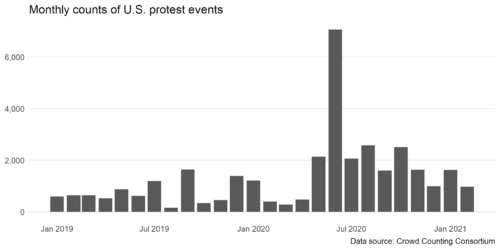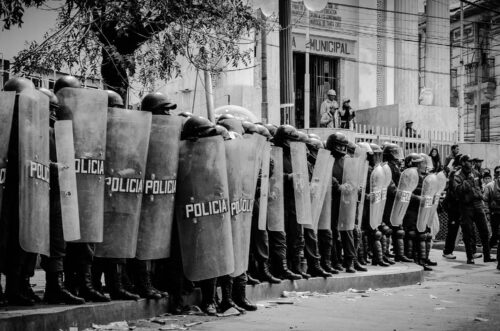
Erica Chenoweth
Frank Stanton Professor of the First Amendment
Protest is the bedrock of democracy. But why do people take to the streets, and how do protestors achieve change? At the Ash Center, we’re working to answer these questions.
From the Boston Tea Party and the U.S. civil rights movement to contemporary climate action demonstrations, civil protest is a fundamental tool for influencing political change. While protest movements are an indelible part of contemporary political life, little is often understood about what motivates people to take to the streets and how they achieve nonviolent political goals.
Our scholars analyze protest movements, learn from protestors themselves, and develop tools to help understand why some protests succeed and others fail.
Frank Stanton Professor of the First Amendment
Lecturer in Public Policy
Assistant Professor of Public Policy
Research Project Manager, Nonviolent Action Lab
Research Associate, Crowd Counting Consortium
Lead Research Fellow for the Nonviolent Action Lab, AY2025-2026
Commentary
So far, the Crowd Counting Consortium has logged just over 5,300 events since Biden’s inauguration on January 20, 2021.
Commentary
Commentary
The Crowd Counting Consortium recorded more than 1,800 protest events in the U.S. in March 2021, with roughly 88,000 to 125,000 participants in the events.
Commentary
Since the Atlanta-area murders, we have logged 126 events focused on this issue, most of them this past Saturday and Sunday, March 20–21.
Commentary
So far, the Crowd Counting Consortium has identified 47 events honoring Taylor on the anniversary of her death in more than 30 localities.
Commentary
One issue has dominated environmental protest activity in the U.S. for at least the past four years, and that’s climate change.
Commentary
So far, we’ve recorded 980 protest events in the U.S. in February 2021, with about 29,000 to 35,000 reported participants in them.
Commentary
Commentary
Just how large and broad was that wave of protests after the death of George Floyd? How destructive was it? And how did police and right-wing counter-protesters respond to it?
Commentary
Under the Trump administration, what did Americans protest about?
Feature
Kennedy School Assistant Professor Yanilda González delves into the roots of police violence in democratic countries in her latest book.
Video
The Ash Center and Carr Center for Human Rights hosted an event for the launch of Authoritarian Police in Democracy: Contested Security in Latin America by HKS Assistant Professor Yanilda María González.
Video
To what extent have these organizations proven better equipped to deal with the pandemic response, and what are the challenges that these associations face when organizing in the age of COVID-19? In addition, how can they seize this moment to turn their organizing into power and influence in political and economic life?
Article
Since the inauguration of Donald Trump, there has been substantial and ongoing protest against the Administration. Street demonstrations are some of the most visible forms of opposition to the Administration and its policies. This article reviews the two most central methods for studying street protest on a large scale: building comprehensive event databases and conducting field surveys of participants at demonstrations.














